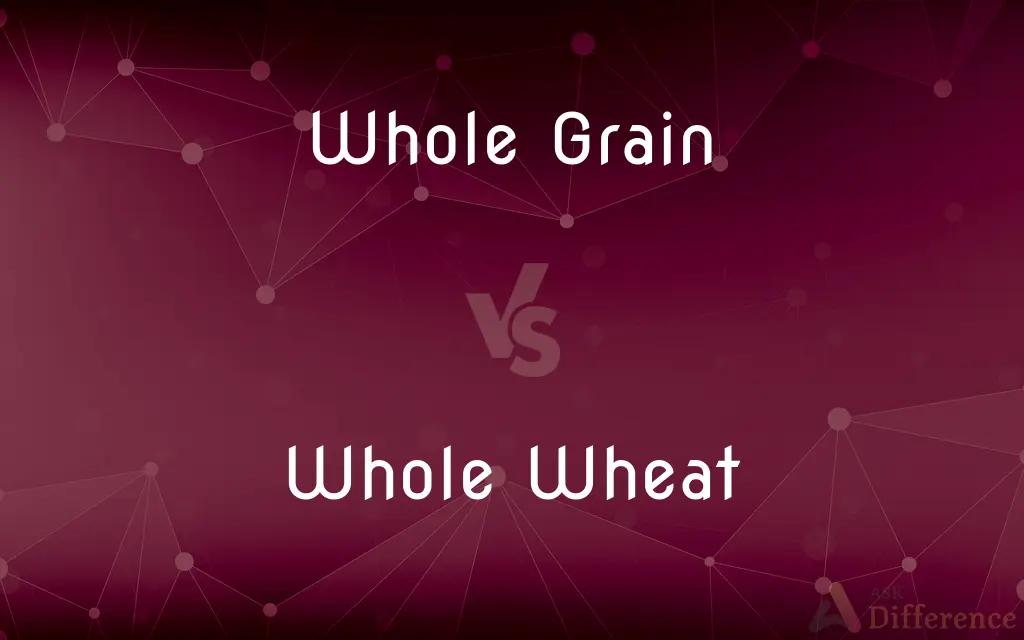Whole Grain vs. Whole Wheat — What's the Difference?
By Tayyaba Rehman — Published on January 2, 2024
Whole grain refers to the entire seed of various grains including all components, while whole wheat specifically refers to the entire seed of the wheat plant.

Difference Between Whole Grain and Whole Wheat
Table of Contents
ADVERTISEMENT
Key Differences
Whole grain is a term that encompasses all types of grains which are used in their complete form, including wheat, oats, rice, corn, barley, and more. It refers to the use of the entire seed of the grain – the bran, germ, and endosperm. Whole wheat, on the other hand, specifically refers to the whole form of the wheat grain only. Like whole grains, whole wheat includes all parts of the wheat kernel.
The primary difference lies in their scope; whole grain is a broader category that includes a variety of grains, while whole wheat is a specific type within this category. Products labeled as "whole grain" can contain a variety of grains, offering a wider range of nutrients and flavors. Whole wheat products, however, are made exclusively from the whole wheat kernel.
In terms of nutrition, whole grains generally offer a diverse range of vitamins, minerals, fiber, and antioxidants, since different grains bring different nutritional profiles. Whole wheat is a good source of fiber, B vitamins, and several minerals, and it's beneficial for heart health and digestion.
Whole grain products can vary significantly depending on the type of grain used, resulting in various textures and flavors. Whole wheat products, such as whole wheat bread or pasta, have a distinctive taste and texture, often denser and more robust than products made from refined wheat.
In dietary guidelines, consumption of whole grains, including whole wheat, is generally recommended over refined grains due to their higher nutritional value and health benefits. Choosing whole grain or whole wheat products is a way to increase dietary fiber and nutrient intake.
ADVERTISEMENT
Comparison Chart
Definition
The entire seed of various grains
The entire seed of the wheat plant
Scope
Includes various types of grains
Specific to wheat grain
Nutrition
Diverse nutrients from different grains
Fiber, B vitamins, minerals from wheat
Flavor and Texture
Varies widely depending on grain type
Characteristically dense and robust
Common Products
Whole grain bread, cereals, rice, oats
Whole wheat bread, pasta, crackers
Compare with Definitions
Whole Grain
Diverse flavors
Whole grain products have a variety of flavors and textures.
Whole Wheat
Entire wheat kernel
Whole wheat flour includes all parts of the wheat grain.
Whole Grain
Variety of grains
Oats, barley, and rice can all be considered whole grains.
Whole Wheat
Dense texture
Whole wheat pasta has a denser texture than refined pasta.
Whole Grain
All grain components
Whole grain bread contains the bran, germ, and endosperm.
Whole Wheat
Specific to wheat
Whole wheat products are made exclusively from wheat.
Whole Grain
Nutrient-rich
Eating whole grains provides essential nutrients and fiber.
Whole Wheat
Wheat nutrients
Whole wheat provides vitamins and minerals beneficial for health.
Whole Grain
Health benefits
Whole grains are beneficial for heart health and digestion.
Whole Wheat
Fiber source
Whole wheat bread is a good source of dietary fiber.
Whole Grain
Alternative spelling of wholegrain
Whole Wheat
Made from the entire grain of wheat, including the bran
Whole-wheat flour.
Whole Wheat
Made with whole-wheat flour
Whole-wheat bread.
Whole Wheat
(of flour) Prepared from all the constituents of the wheat grain.
Whole Wheat
(of bread etc) Made from whole-wheat flour.
Whole Wheat
Of or relating to or derived from wheat;
Wheaten bread
Common Curiosities
Are all whole grain products whole wheat?
No, whole grain products can include other grains besides wheat.
Are whole grains good for weight loss?
Yes, their high fiber content can aid in weight management.
Can I substitute whole wheat for white flour?
Yes, but it will change the texture and flavor of the baked goods.
Is whole grain rice the same as brown rice?
Yes, brown rice is a type of whole grain.
Can whole wheat reduce the risk of heart disease?
Yes, its fiber content can contribute to heart health.
Is whole grain healthier than whole wheat?
Both are healthy, but whole grains offer more variety in nutrients.
Can diabetics benefit from whole grains?
Yes, they have a lower glycemic index compared to refined grains.
Does whole wheat contain gluten?
Yes, whole wheat contains gluten.
Can celiac patients eat whole grains?
They should avoid wheat but can have gluten-free whole grains like rice or corn.
Do whole grains take longer to cook?
Yes, generally they have a longer cooking time than refined grains.
Are whole grain foods always organic?
No, organic certification depends on farming practices, not the grain type.
Is whole wheat bread a good fiber source?
Yes, it's a good source of dietary fiber.
Should whole grains be stored differently?
They should be stored in a cool, dry place, sometimes refrigerated to preserve freshness.
Do whole grains help with digestion?
Yes, their fiber content aids in digestion.
Does whole wheat have more protein than white wheat?
Yes, it retains more protein as it's less processed.
Share Your Discovery

Previous Comparison
Search Engine vs. Web Browser
Next Comparison
Olive Oil vs. Vegetable OilAuthor Spotlight
Written by
Tayyaba RehmanTayyaba Rehman is a distinguished writer, currently serving as a primary contributor to askdifference.com. As a researcher in semantics and etymology, Tayyaba's passion for the complexity of languages and their distinctions has found a perfect home on the platform. Tayyaba delves into the intricacies of language, distinguishing between commonly confused words and phrases, thereby providing clarity for readers worldwide.














































